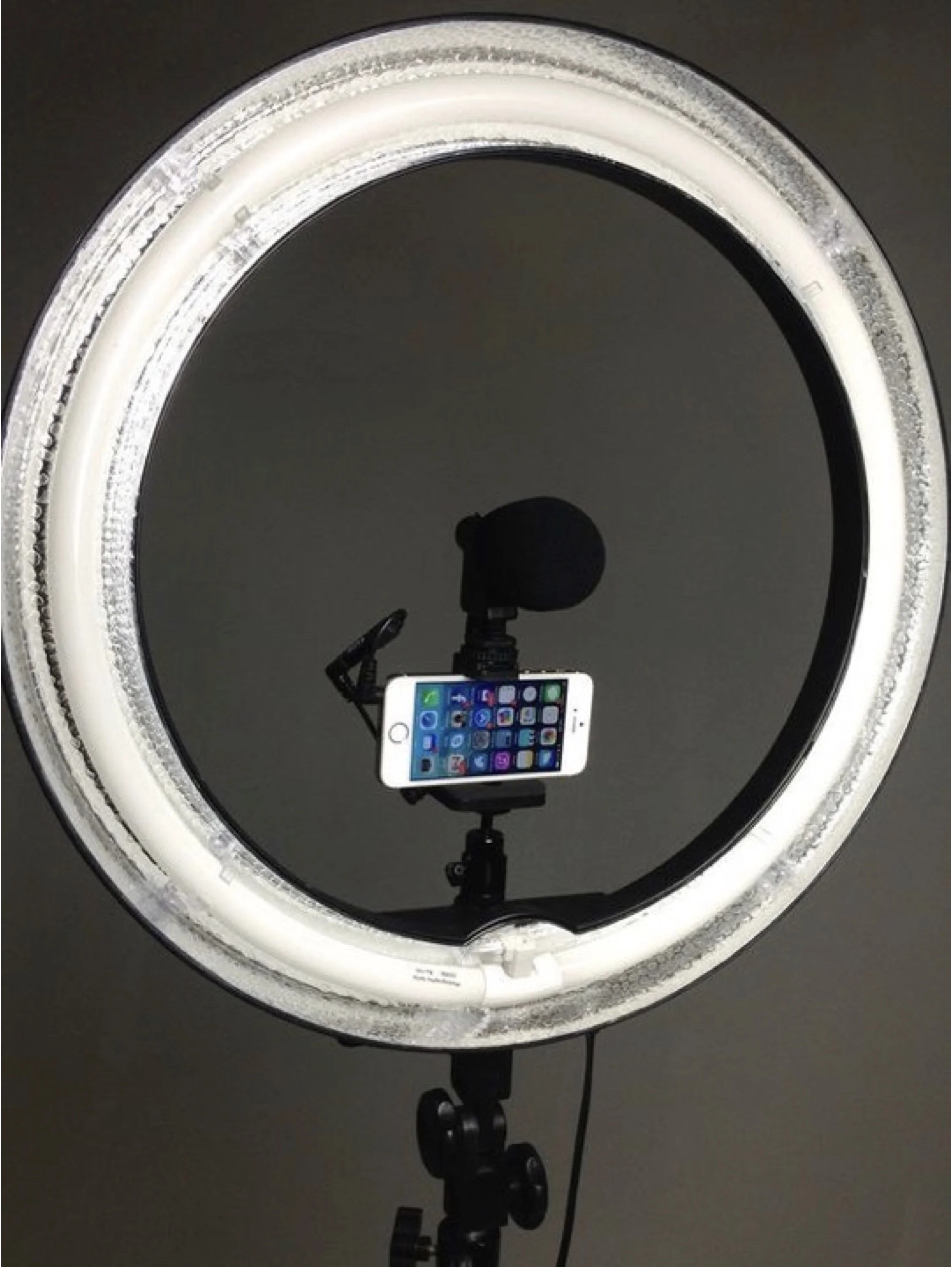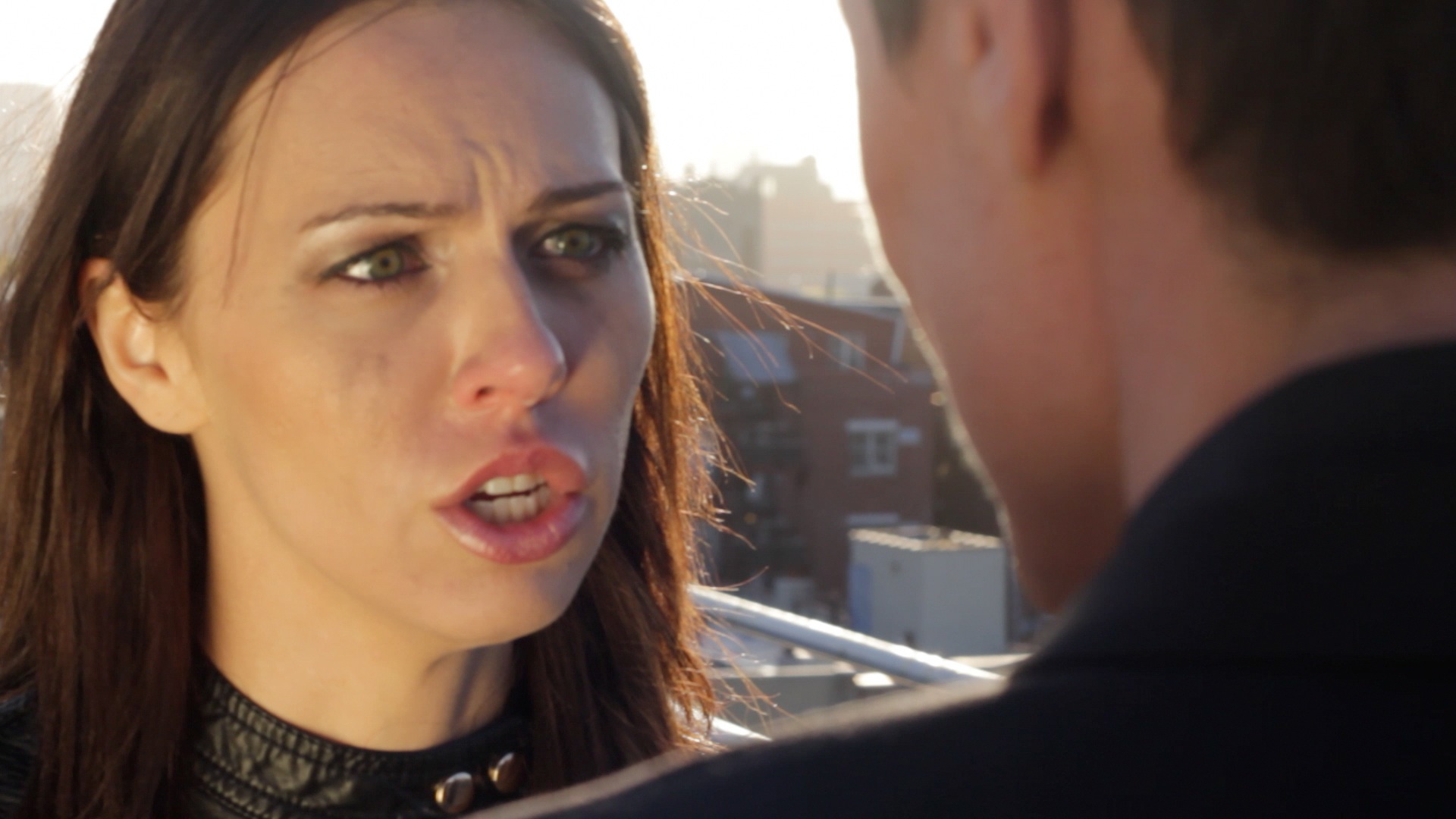Come meet Jessica Sue!
Power Of Creation. A Preview Of Ilona Siac
In my new class, this is where I want my clients to get to: figuring out what they want to do, what they are compelled to do, and actually doing it. I directed this and helped created the material. Craig wrote it. It's just a sneak peak. There's more.
Meet Ilona Siac.
Laughing Just Thinking About Jeff as Clark....
So I got this is my email. :-). A great way to start of the weekend. ROZ
“I just finished shooting a video audition with Roz, and can I tell you, it was AWESOME! The sound, video and lighting quality were all great, but what was really awesome was that Roz coached me to a much much greater performance than I could have had on my own, AND I LEARNED some really great acting lessons along the way! It was an enormous advantage having an actress/teacher/director as talented as her helping you during your audition! And on top of everything else, Roz made the entire process so much fun and exciting—how often can you say THAT after an audition? I highly recommend her services—it was worth every penny for me.
Thanks so much Roz! And nice to meet you Craig!”
Training
Education
| Yale School of Drama - MFA, Acting | |
| Howard University - BFA Cum Laude, Drama | |
| Continued Professional Development | |
| Actor's Center Teacher Development Workshop | |||
| Sam Christensen Intensive Workshop | |||
| Writing Workshop, Ela Thier | |||
| Advanced Cold Reading Master Class, Margie Haber | |||
|
Teaching Apprentice, Margie Haber Studio Master Acting Class, The Actor's Center Lloyd Richards |
|||
| Master Playwriting Workshop, The Public Theater George C. Wolf | |||
| Fiction Memoir Writing Workshop Greg Lichtenberg | |||
| Method Writing Kathrin Seitz | |||
| Sande Shurin Transformational Acting Workshop | |||
On Stage
Broadway | |
|---|---|
| THE MOUNTAINTOP us | Kenny Leon |
| RADIO GOLF us | Kenny Leon |
| SEVEN GUITARS* | Lloyd Richards |
| THE PIANO LESSON | Lloyd Richards |
| MULE BONE | Michael Shultz |
| BITTER TEARS OF PETRA VON KANT | Ian Belton |
| *originated role | |
Off-Broadway | |
| ZOOMAN & THE SIGN | Signature Theatre/Steven Henderson |
| WAR | Rattlestick Theatre/Anders Cato |
| THE SIN EATER | 59 E 59th Street/Billy Hopkins |
| CARSON MCCULLERS (HISTORICALLY INACCURATE) | Playwrights Horizons/Marion McClinton |
| BREATH, BOOM* | Playwrights Horizons/Marion McClinton |
| THE OLD SETTLER | Primary Stages/Hal Scott |
| EVERYBODY'S RUBY | Public Theatre/Roberta Levitow |
| MAJOR CRIMES | Actor's Studio/Arthur Penn |
| INSURRECTION . . . HOLDING HISTORY | Public Theatre/Robert O'Hara |
| THE DESTINY OF ME | Lucille Lortel/Circle Rep |
| WYOMING | 78th St Theatre Lab/Eric Nightengale |
| *originated role | |
Regional | |
|---|---|
| BREAKFAST WITH MUGABE American premiere | Centenary Theatre/David Shookok |
| LEVEE JAMES* | American Conservatory Theatre |
| THINGS OF DRY HOURS* | Pittsburch Public Theatre |
| DOUBT | George Street Playhouse/Anders Cato |
| THE COLORED MUSEUM | The Alliance Theatre |
| INTIMATE APPAREL | Philadelphia Drama Guild |
| PEKONG | American Conservatory Theatre |
| THE COMEDY OF ERRORS | Shakespeare and Company |
| THE WINTER'S TALE | Shakespeare and Company |
| MISS JULIE | Yale Repertory Theatre |
| LOVE'S LABOURS LOST | Shakespeare Theatre Company/Michael Kahn |
| THE WINTER'S TALE | Shakespeare Theatre at the Folger |
| DANCING ON THE CEILING | American Stage Festival |
| SEVEN GUITARS* | The Goodman |
| SEVEN GUITARS | Huntington Theatre Company |
| TWO TRAINS RUNNING | Center Stage |
| GOD'S HEART* | Trinity Rep/Craig Lucas |
| A SUNBEAM* | Virginia Stage Company |
| STARTING MONDAY* | Anne Commire |
| TROILUS AND CRESSIDA | Yale Repertory Theatre/Andre Belgrader |
| AS YOU LIKE IT | Yale Theatre |
| THE SEAGULL | Yale Theatre |
| NORA | Yale Theatre |
| RHINESTONES AND PASTE* | Yale Cabaret/Lynn Nottage |
| RUNAWAY HOME* | Studio Theater |
| *originated role | |
Hair & Make Up
Hello This Is Me Monologue. GET ONE
http://www.actorslife.com/article.php?id=241
Director, Coach, Author - Karen Kohlhaas, Atlantic Theater Company, MonologueAudition.com
Karen Kohlhaas is a theater director, a founding member of New York 's Off-Broadway Atlantic Theater Company, and a senior teacher at the Atlantic Acting School. She will be directing the world premiere of Annie Baker's "Body Awareness" at Atlantic, performances start May 28, 2008. She recently directed actress-comedienne Judy Gold in the Drama Desk Award nominated "25 Questions for a Jewish Mother" by Kate Moira Ryan (written with and for Ms. Gold), which ran Off-Broadway for six months and is now on a national tour.
In addition to teaching at Atlantic, she teaches her own monologue, audition, and directing workshops in New York, and has guest taught in Vancouver and Sydney. She is the author of "THE MONOLOGUE AUDITION: A PRACTICAL GUIDE FOR ACTORS" (foreword by David Mamet), and the director, writer and co-producer of "THE MONOLOGUE AUDITION VIDEO (DVD)" (120 minutes), the only DVD that shows a complete approach to directing, acting, and auditioning with monologues, and includes 30 minutes of bonus interviews with 7 industry professionals who have seen thousands of auditions.
Books, DVDs, articles, and other actor resources including “The Overdone Monologue Survey” are all available at WWW.MONOLOGUEAUDITION.COM
Interviewed by Joanna Parson
Let's start simply. What exactly is a monologue? A monologue is a speech given by one person. A monologue for an audition is most often from a scene in a play, but actors frequently do monologues that are from sources other than plays.
When does an actor need to audition with a monologue? For general theater auditions such as EPA's; sometimes for auditions for specific parts in theater productions, though this is mostly at the non-professional level; for agents, casting directors, training programs, grad schools, summer stock, repertory theater, intern programs, and occasionally films.
Does a monologue have to come from a play? What are other sources for monologues? The audition listing will often specify if the monologues need to be from a play, but sometimes not. If it is a theater audition, the monologues should virtually always be from plays. Other monologue sources include screenplays, fiction/prose (but only if the language sounds like dramatic dialogue when spoken out loud; some fiction writers have a good ear for dialogue and some writers' work when spoken aloud sound bookish and non-active). Sometimes poems work but the same rule should apply as in fiction - it should not sound poem-y. I don't think most songs work as monologues (especially well-known songs).
Other sources include essays, editorials, TV shows (such as Law & Order testimonies - some great stuff, most of their writers are playwrights!); historical letters or speeches, interviews (such as a fascinating person interviewed on Larry King Live) and even talk radio. My current favorite sources to recommend to go off the beaten track are the Onion (humor newspaper and website) and "The Best of Craigslist" (found on any Craigslist site - some often hilarious rants). But the actor should absolutely note the requirements of the audition when choosing material.
What are the different types of monologues an actor might consider working on? If an actor only had time to work on a few monologues, which are the most important ones to prepare? It all depends on what that actor will be auditioning for, and wants to be auditioning for. There is no formula. Some actors don't ever want to do Shakespeare; some ONLY want to do Shakespeare. The best way to know what material to choose is to study the individual audition, and get specific and appropriate to its demands. Many actors only have 1 or 2 pieces they do, and they hate them and it shows.
I find this is because they don't have a clear way of working on monologues, which is why I developed my class, book, and DVD. When an actor does have a fun and effective monologue technique, he or she will work on specific monologues for individual auditions that are well-chosen and personal. They will stand WAY out from the other 95% who just bring in the same old stuff.
I don't buy the "don't have time" issue - that's like a doctor saying she doesn't have time to keep up with the medical developments in her field. It's an actor's job not only to keep his chops in shape, but to be constantly reading, learning and growing so he has more chances of being cast.
Monologues, when an actor is in the stage of her career when she needs them, are the single most accessible, empowering, and practical way to develop and grow and an artist AND have a way to immediately show those skills to people in the audition room. It may sound like a lot of work to develop a large repertoire of monologues, and to be able to work a new one up quickly and specifically for a particular audition, but believe me the actors who do will be more experienced, confident, and cast. What kind of performance will we see in the room when an actor is habitually doing the LEAST he needs to do to get by? You can instantly sense the ones who are putting in the work. They stand head and shoulders above the rest.
What are the most common mistakes actors make in choosing monologues? I asked similar questions to 10 industry pros who have seen thousands of monologues during the "Overdone Monologue Survey" that is on my site (I answered it too). So this is not just my opinion. The biggest mistake is doing a monologue out of the actor's age range. Followed closely by material that tries to accomplish too much/show too many facets of the actor, and material inappropriate for a particular audition (such as gratuitously gross, or too sexually and/or violently graphic with no payoff/justification), and also overdone material.
In your DVD, you discuss the difference between choosing a monologue one might perform for an agent or casting director, versus a monologue that one might choose in order to audition for a theatrical season or a multiple of roles. Can you explain that difference? The agent or casting director, on first meeting, needs to see "who you are," a role quite close to the actor that is not a stretch to imagine him playing. I call this a "Hello, this is me" monologue. In (very) brief, a "Hello this is me" should not be: classical/period, far from the actor's personality, inappropriate (gross/graphic), cynical, complaining, depressing, angry or neurotic (pet peeve: no more monologues by women about how some guy treated them horribly!).
A "Hello this is me" should/could have: closeness to a specific, readily seeable aspect of the actor's personality; humor, fascination, wonder, passion, insight. I'm not saying NEVER get angry or negative in these monologues, but pieces that are largely negative or angry are not good "Hello this is me." The rule of thumb is, would you be comfortable hearing this monologue given by someone you've just been introduced to at a party. And to remember that industry auditions are business situations - not a great time to talk about explicit sexual exploits or body fluids or functions (there are an amazing amount of these monologues out there).
Agents and CDs also need to see that the actor has a sense of where he could fit in the general mainstreams of casting. I'm not saying it's fair, it's not - but look at TV and you'll see it. Theater and independent film have more leeway, but not much. On the other hand, the theater audition for a repertory company - or even the "company" a graduate school is "casting," DOES want to see range - "Oh, we could cast you as both Lady MacBeth and as Masha." If the actor can pull both off, it's a successful audition. Sometimes an actor tries to bring in a range that is too wide, and one of the two won't work. Both roles need to be within the buyable playing range of the actor (and he/she should get multiple opinions about this if unsure).
Talk about your "storyboarding" concept, where actors choose actions to go along with different parts of a monologue. I actually call them "Descriptions" instead of "actions."
"Action" is an acting term. Descriptions are directing terms, and 1/3 of the monologue technique I teach is Directing Technique. An actor chooses 8 to 10 "chunks" in a monologue and writes a description for each. A description is a very visual adverb+verb combination that describes what the director wants the audience to SEE in each chunk. We make sure the descriptions are vivid, physical and most importantly that they have variety - so that the monologue won't stay on one note (the most common pitfall of monologue performance).
What about physical movement in a monologue? Should actors use blocking or choreography in monologue auditions? I firmly believe that movement should be chosen. There could be several moves, if that supports the story, or just one or two. The most important thing is to choose - instead of leave it up to chance, as many actors do. Then they either freeze, or move unspecifically. Virtually all stage productions have set blocking in performance. An audition is the same. When an actor doesn't set movement, she's rehearsing in front of them instead of performing. She needs staging she can rely on when the pressure is on. No cast would feel okay performing in front of critics without set blocking!
Should an actor perform a monologue from a play they've done in a full production? Do they need to approach it differently than they did before? They can, if they can truly look at it as a stand-alone story, out of the context of the production. They should make sure they have a clear beginning, middle, climax and end, and be able to perform the piece fully without the buildup into the monologue they got from doing the entire role. They should also not try to stuff the whole role into that monologue - let it be the short 2 minute story that it is.
When should an actor sit in a chair during a monologue? Is that a no-no? Chairs tend to suck the energy down. Many actors do monologues in chairs to avoid the discomfort of moving in front of others. If it's a theater audition you must show them what it is like to see you move on stage, even if it's just a bit. If there is a true need or desire to do the piece in a chair, I think actors should first stage a monologue standing (unless the piece is in a wheelchair, a car, or otherwise seated), and then put it in a chair, while keeping the dynamics of the original blocking. Once the piece is staged standing, it will be more energetic when put into a chair, and then the actor can do it both ways.
The times to do a seated monologue are 1) when the piece demands it 2) when asked to in the audition 3) for an on-camera audition 4) for an audition in an extremely small space.
You say that the secret to acting monologues is listening. How can an actor listen, when he or she is the only one talking? There is a very simple adjustment that makes it possible to "listen" in a monologue just as we do in life. Anyone reading this article has already had a few conversations in their head today - conversations in which the other person was not physically present (that person could have been thousands of miles away in fact). But in the reader's head that person was responding and participating in the conversation. We harness that natural skill that we all already have, and that makes monologues become alive, two-way conversations. You can really see and feel the difference between a one-way monologue performance and a two-way monologue performance.
Do you recommend using props when performing a monologue audition? (A phone, a bottle, a handkerchief?) Use only when necessary and make them as simple as possible to produce, deal with, and get rid of.
How do you recommend actors practice their monologue auditions? Are there any specific techniques that actors should use? (Practicing in front of a mirror, watching themselves on video?) Personal opinion: never practice in front of a mirror; you'll just be watching yourself, which is acting death. Always, always practice the acting of a monologue with a partner watching. (You can address it directly to a partner sometimes to see what it's like to get a live response, but ultimately practice more often looking just over the partner's head so you get more of an audition room experience (most auditors absolutely do not want to be acted to).
No one ever hired an actor to act in a room by himself! Rehearse in the environment that you will be performing in. Only use video if you can handle watching and hearing yourself. In my experience some actors can, and some can't - just like some movie actors always watch their dailies and some never do. One very good use of video is to have someone film you from the side, so that you can see how you are using your alignment (this can be watched with sound off). This is often a huge awakening for many actors about how much they are thrusting their heads and upper bodies forward, which weakens the performance and strains the voice.
You believe that actors also need to be aware of how they walk into an audition room. How can actors work on walking into a room and presenting themselves effectively before the monologue even begins? The short answer is to be "Big and Slow and Positive" when entering and exiting the room. A full third of the technique I teach is Audition Technique. There are many tiny but important moments that surround the actual acting in an audition. An actor can give off a positive, warm, confident and professional impression in these moments, she can neutralize them, or she can actually say negative things about herself in these moments.
Most actors neutralize them, and only a small percentage, in my experience, really master the art of positive self-presentation. It's been proven that body language is more powerful communication than verbal communication, so all words need to be backed up with behavior. An actor can learn and practice a positive intention toward her auditors when entering, interacting and exiting the room. This intention can be made habitual - think of the great hosts you know - and it can and should be completely separate from how nervous she is, or how she feels the audition went.
Amanda Charlton from the Williamstown Theatre Festival says in your DVD, "About 10 percent of the actors we see look like they're having fun performance—and those are the ones we take." What can actors do to up their own fun quotient when performing monologues? That percentage is true - people who watch auditions will actually say it's 10% or less - across the board. 90% or more are treating the audition as something unpleasant they must "grin and bear" or "get through" to get to the "real acting." So who wants to hire someone who looks like they just want to get through it?
The 10% (or less) are the ones who have truly learned to enjoy performing - anywhere, anytime. How to get there with monologue auditions? All of the above: have a practical and reliable rehearsal process; work on many monologues to increase your chops, range and confidence level; read all the time to find fantastic material that you love (and don't ask others to find it for you); learn to stage yourself effectively; develop strong audition technique; and learn to treat auditions as a fun adventure, and the next steps to your dreams. Is that last part hokey? Maybe, but it's completely possible.
What did you think of this interview? Let us know! feedback@actorslife.com
I am famous and have great teeth! about 52:40 Thanks Sarah Lane
Thanks to my client I caught this
Why Not?
Similar w Margie Haber
iRoz App Available in iTunes App Store FREE
The purpose of the app is to provide answers to your questions. You have direct contact with me and I will provide audio answers to your questions as well as inspirational stories from the Red Wall Productions Artist Team.
A&E: Hurts Like Love - Edmond Outlook - Edmond, Oklahoma Monthly Magazine
Very proud. From Evernote: A&E: Hurts Like Love - Edmond Outlook - Edmond, Oklahoma Monthly Magazine Clipped from: http://www.edmondoutlook.com/archives/m.blog/27/view/898 Edmond Outlook Twitter Edmond Outlook Facebook Edmond Outlook Blog
Edmond, Oklahoma's largest monthly magazine covering 50,000 homes and businesses with free, direct-mail delivery.
HOME COMMUNITY ABOUT US CURRENT ARTICLES ARCHIVES ADVERTISE BLOG CONTACT US I've been advertising in Edmond Outlook since their very first issue and I continue to get outstanding results. They do a great job!
- Greg Porter, Porter's Quick Oil Change
A&E: Hurts Like Love Posted by Nathan Winfrey in the May 2011 Issue “Breaking into the business” has been the goal of countless hopefuls who moved to Hollywood and then moved home again without one screen credit. Recent decades have seen the rise and legitimization of independent film, but it wasn’t until the past few years that quality camcorders and affordable video editing software have made filmmaking something that could be done with a few bucks and a dream.
“We are living in a very different time for artists, having the power to create their own work and reach audiences without waiting for people to call you up and see if you want a job,” says Toni Robison-May, an Edmond native who moved to Harlem, New York, three years ago. She is currently enjoying the festival circuit with her debut film, "Hurts Like Love". “I had a story to tell and I had the means to get this done,” Robison-May says.
"Hurts Like Love" is a monologue short that tells the story of a woman’s personal struggle on the day of her best friend’s wedding. The film’s only on-screen character, Mel, is the product of improv sessions with Robison-May’s acting coach and mentor, Rosalyn Coleman Williams. Robison-May interacted as Mel with her mentor to improve the dialogue, and then went home and wrote the script.
“I wanted to do a character-driven story based off of a character that I came up with during an exercise in acting class. It was something that really moved me and I wanted to do more with that character,” Robison-May says.The plot is a combination of that character and what she’s gone through in her experiences as a young woman. “Mel is different from who I am as a person, but there are similarities and I think everyone can relate to her because it’s about what unrequited love feels like and what it can make you do,” she says.
With a running time of less than 10 minutes, the film is mostly Mel talking into a camera, but Robison-May was careful to avoid the pitfalls that often plague such experiments.
“A lot of times when you see one person talking to the camera, the audience can feel left out and feel like this whole piece was done for the actor, to celebrate them and make them look good, but it does nothing for a compelling story and other stuff that the audience cares about,” she explains. Her goal with "Hurts Like Love" is that the audience doesn’t feel like it is a vanity piece.
"Hurts Like Love" was shot in one grueling 16-hour day. There was a tiny amount of improvisation, but Robison-May stuck closely to the script. “I feel like what was left on the cutting room floor was for the best, and now the piece that I have is something I’m extremely proud of to present to audiences,” she says.
The film premiered at The View From Here Film Festival in Fairfield, Connecticut, but it was still a rough edit with temporary music. When the final, polished version of the film screened at iNdie Power in New York in February, Robison-May had intentionally avoided seeing the final cut so she could experience it for the first time with the audience. “It was really well received. I was so happy with it,” she said. The screening was standing room only. They had to turn people away because they were afraid the fire marshal would shut the event down. “We were amazed by the turnout,” she says.
She hopes to screen the film at deadCENTER Film Festival in Oklahoma City in June. Other festivals are likely in the future, as well as a release on Amazon.com and a possible appearance on the BET short film showcase. Robison-May also is setting her sights on a Web series between auditioning and meeting with casting directors for other projects. She plans to collaborate with a playwright for a stage production of a new work, and then adapt that into a film as well.
“After having done this film, I feel encouraged to get out there and do more. I don’t feel like my career is dangling in the hand of some great and powerful Oz. I can do something like my own short film and have it screened,” she says.
To find out more about Robison-May and "Hurts Like Love", visit twitter.com/toekneenyc or www.hurtslikelove.com .
« Back to Past Stories Post A Comment Name Email (Will not be published) Comment CAPTCHA Image Image contains only uppercase letters. Please enter the letters above. Save Comment Cancel HOME COMMUNITY ABOUT US CURRENT ARTICLES ARCHIVES ADVERTISE BLOG CONTACT US ©2010 Back40 Design | Mobile Site Website designed by Back40 Design & managed by Javelin CMS
@HenryStreet thanks for the RT

LOOK at what I got on Facebook....so proud...
Tamika RS Hi Roz. Just saw you in "Frankie & Alice". Congrats you were awesome. And Halle said great things about you at tonight's Q&A. :)
Final week to experience Mugabe.

Dear Theatre Lover, Don't miss this very special event. Only One week is left as we continue our first season in our new home. This will be unlike anything you usually experience!
BREAKFAST WITH MUGABE
by Fraser Grace
Final week
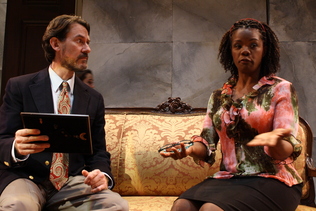
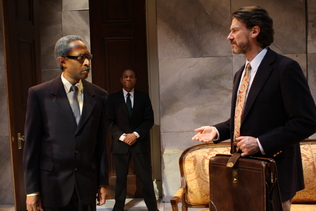
The Reviews Are In:
"Imagine a modern-day Macbeth, haunted by the ghost of Banquo, attempting to sort out his blood-stained fears with the help of a therapist." Michael Sommers NY Times
"The acting is beyond superb" Ruth Ross NJ Arts Maven"Award-winning drama is a gem at the Centenary Stage" Rick Busciglio Examiner
"...outstanding cast "William Westhoven NJ Daily Record
“Breakfast with Mugabe” is an ideal way to break in the new Edith Bolte Kutz Theater, a black box for experimental work. The intimate space has been filled with armless chairs. At Friday night’s opening, many a theatergoer was on the edge of his.Peter Filichia The New Jersey Star Ledger
![Mugabe-poster-web-2[1] Mugabe-poster-web-2[1]](http://img-ak.verticalresponse.com/media/a/2/e/a2e8d1aa4e/c480981ce6/9843b69b87/library/Mugabe-poster-web-2%5B1%5D.JPG?__nocache__=1)
Robert Mugabe is haunted by ghosts.
And he has an election to worry about.
Luckily, he has summoned a noted psychiatrist to help mediate the "ngozi"- or evil spirits for him. But as the white, tobacco-farm-owning doctor in a land of social turmoil and economic collapse, the cost of Dr. Peric's analysis threatens to come at grave personal expense.
Award-winning playwright Fraser Grace brings his compelling drama of psychological intrigue and political strife, Breakfast with Mugabe, to the Centenary Stage Company for its New Jersey premiere. "Mugabe ..." will christen the new Edith Kutz Bolte Theater of the David and Carol Lackland Center November 5 – 21, in Hackettstown.
First produced at the Royal Shakespeare Company in Stratford (directed by Anthony Sher) Breakfast with Mugabe transferred to London's West End, and was named joint winner of the John Whiting Award for best new play of 2006.

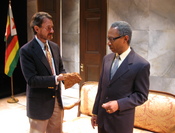
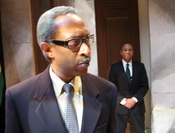
CAST OF MUGABE Directed by David Shookhoff
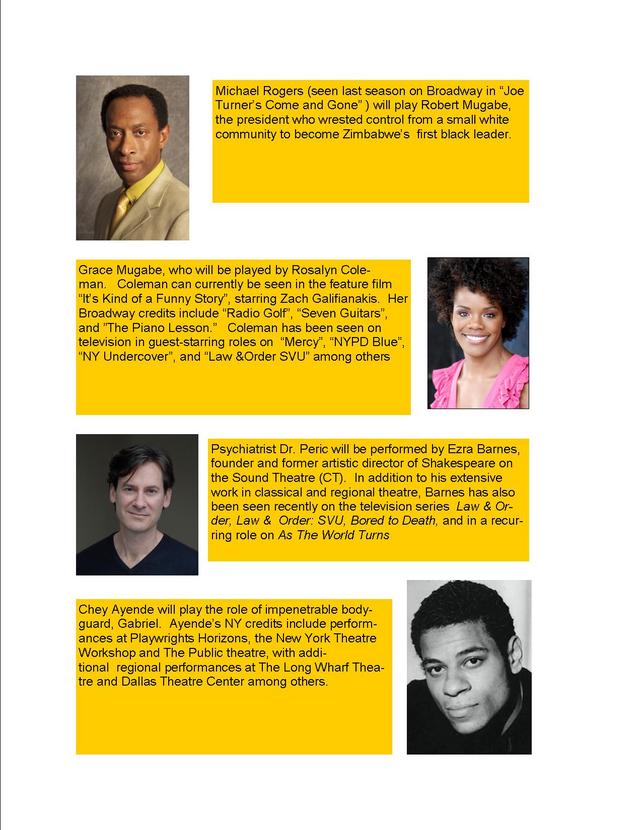
Other Upcoming Events In November:
If You Give A Mouse A Cookie Nov.16-20
Oliver Nov. 26-Dec. 12
Danny Mixon on PianoNov. 28th
Forward this message to a friend Now's the chance to get the best seats in the house! We stand by, ready to serve!
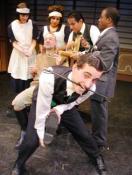

Become A Fan of Centenary Stage
Enjoy Dinner Before Or After A Show

Mama's Cafe Baci
Mattar's Bistro Lounge
Pandan Room
Prickly Pear Restaurant
Marleys Season Sponsors







Click on the CSC website above for tickets and details on all our great events for 2010-2011
Unsubscribe Info: This email was forwarded to you by ezbarnes@aol.com. This action did not cause your email address to be added to any mailing lists. You will not receive any future emails unless you choose to subscribe to the list by clicking the opt-in link at the top of this email.
Centenary Stage Company
400 Jefferson Street
Hackettstown, New Jersey 07840
Read the VerticalResponse marketing policy.
Review from Times
November 12, 2010
Theater Review | New Jersey
The Perils of Psychoanalyzing Mugabe
By MICHAEL SOMMERS
Imagine a modern-day Macbeth, haunted by the ghost of Banquo, attempting to sort out his blood-stained fears with the help of a therapist.
The resulting drama might be something like “Breakfast With Mugabe,” a compact, troubling thriller by Fraser Grace, being presented by the Centenary Stage Company in Hackettstown. The playwright has said in interviews that he was inspired by a newspaper report that Robert Mugabe, the autocratic president of Zimbabwe, was being treated by a psychiatrist.
Originally produced by the Royal Shakespeare Company in Stratford-Upon-Avon in 2005 and first staged in America by the Quantum Theater in Pittsburgh in 2008, the drama inaugurates the 99-seat Edith Bolte Kutz Theater in the newly opened David and Carol Lackland Center.
The intimacy of the airy black box space is conducive to the effectiveness of “Breakfast With Mugabe,” which tautly depicts a struggle of wills between the African ruler and Dr. Andrew Peric, a white Zimbabwean psychiatrist summoned to the presidential palace.
Awaiting Mr. Mugabe’s arrival, Grace, his considerably younger second wife, attempts to bend Dr. Peric to her own interests even as she describes her husband’s frightening visitations by a ngozi — a malevolent spirit only he can see.
Immediately asserting his supreme authority, Mr. Mugabe insists that the doctor change his necktie. “I prefer our staff to be coordinated,” he explains, as Gabriel, a tight-lipped bodyguard, presents alternatives. Although Dr. Peric reluctantly complies, the psychiatrist firmly sets his own terms for their professional relationship, to which his patient vaguely assents.
During this initial encounter, the playwright quietly establishes a number of crucial points that the audience needs to know about Mr. Mugabe and his culture, including the importance of ancestral spirits and the bitter history between Zimbabwe’s native people and the white colonists who once dominated the country.
The fact that Dr. Peric owns a farm that has been in his family for several generations also figures into the drama when it is revealed that his land is being occupied by Zimbabwean militants.
As the 95-minute play unfolds in six scenes, Dr. Peric determines that the ngozi afflicting Mr. Mugabe happens to be a former revolutionary comrade and potential political rival who died under mysterious circumstances. Figuring out the significance of that apparition for Mr. Mugabe culminates in a psychological breakthrough that ultimately leads to disastrous consequences for Dr. Peric and others.
While the program contains a two-page glossary of Zimbabwean cultural terms, not all the drama’s social and historical perspectives are spelled out so clearly by the playwright. Audiences in this country may be less familiar with Zimbabwe than those in Britain, its former colonial ruler. Still, sufficient background is provided to let us quickly appreciate that Mr. Mugabe is a very dangerous case for any psychiatrist to treat, which makes Dr. Peric’s attempt to do so appear both noble and foolish.
David Shookhoff, the director, stages the play at a steady pace within the stately marble halls of a stiffly furnished reception room, designed by Lee Savage, that gives little indication of any chaos happening on the other side of the presidential gates. A closer examination, however, shows this grand room is built upon a bleak foundation of cinders and stray half-buried objects — shoes, books, tools — indicating the human wreckage beneath Mr. Mugabe’s regime.
The lighting, designed by Ed Matthews, is consistently clear and bright overall; narrowing the focus and creating some darkness hovering over the sessions between the psychiatrist and his patient could evoke the mystery of the spiritual forces they discuss.
For the most part, performances are understated. Michael Rogers, eyes glittering behind designer glasses, depicts Mr. Mugabe with an authoritative air, a smooth, deep voice and a carefully controlled exterior that occasionally blazes into ferocity. Ezra Barnes, who also played Dr. Peric in the Pittsburgh production, is a mild-mannered yet tenacious figure as a man who loves his land perhaps too much. Che Ayende confidently portrays the watchful bodyguard.
More flamboyant than the men, Rosalyn Coleman, looking chic as Grace Mugabe, sweetly hints at a malicious streak within a manipulative, complex individual.
Retail therapy. Back to Zimbabwe

Sent from my iPhone. (That's why it's short & sweet w/ typoes)
For Business:
For Fun:
After Sam

The other thing that I wanted to share with you is that the role that I'm playing in the play that I started rehearsal for today is Robert Mugabe's wife Grace. So it's a role where I can play with power and beauty a director asked told me that she was dazzling. Dazzling. That was one of my neighborhood titles. Sent from my iPhone. (That's why it's short & sweet w/ typoes)
For Business:
For Fun:
See this play! Artists @ work

Brilliant!!!! See this.

